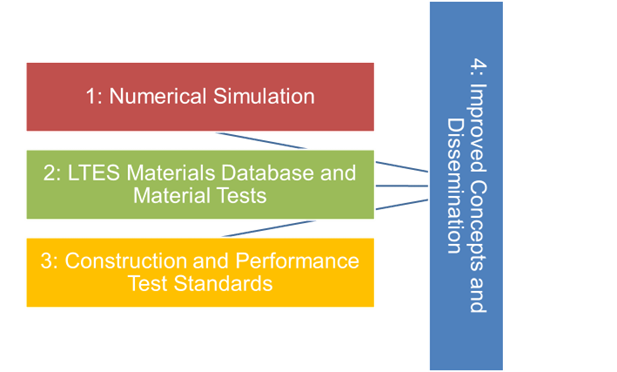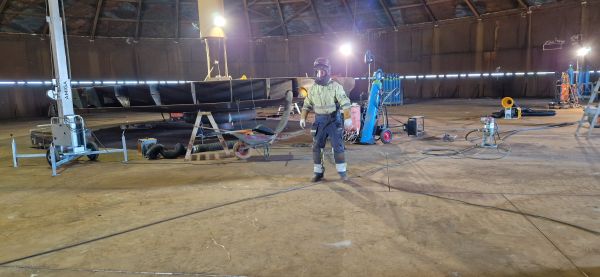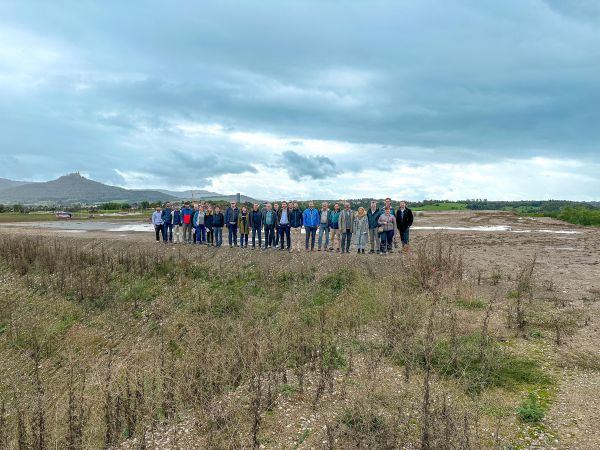IEA ES Task 45: Accelerating the uptake of Large Thermal Energy Storages
Short Description
The overall aim of Task 45 is to provide the framework and knowledge to enable accelerated market introduction of large-scale thermal storage (LTES) technologies. The focus is on higher technology readiness level (TRL) and addresses the questions and challenges of project developers, planners, and designers, executing companies as well as investors and operators of LTES systems. In addition, work is underway to provide a basis for future standards and performance testing for LTES systems required for market launch.
The sub-goals of the new task are:
- Improving numerical simulation: There is a clear need for pre-design tools capable of providing early, accurate estimates of the performance of LTES systems and identifying the technical-economic benefits at an early planning stage.
- Expanded LTES material database and the development of material testing methods: It is important to consider the influence of moisture at higher temperatures (e.g. permeability properties of sealing materials, thermal conductivity of insulation materials) and to create service life calculation models. A comprehensive material database enables more precise predictions about the behaviour of a LTES and helps improve system performance and reliability.
- Development of a basis for future performance control standards: Establishing uniform performance control standards facilitates interaction and communication between suppliers and performers. These enable verification of the actual performance of LTES systems and can lead to the introduction of performance guarantees.
- Targeted creation of information and training materials for decision-makers, implementers, and developers: These materials serve to impart relevant knowledge and provide practical guidance to promote understanding of LTES and support successful implementation.
- Improved concepts and technologies: Includes exploring approaches to increasing storage temperatures, such as using pressurized systems, high temperature aquifer thermal energy storage (HT ATES), rock or sand storage, as well as exploring the use of existing infrastructure such as gas or oil reservoirs, Mines, clay mining areas or gravel pits. This inventory records information about the TRL of the various approaches and their potential applications.
The work is carried out in 4 subtasks, as shown in the figure below:
The following results from Task 45 are planned:
Numerical simulation:
- A report on the comparative testing of numerical simulation programs for different LTES technologies.
- A first collection of so-called pre-design tools and their description on the Taks45 website.
Materials database:
- Report on the structure of the database and how the database can be used.
- Descriptions of methods for determining moisture and oxygen dependent material properties and estimated lifetimes at the laboratory level and in the field
- A model for determining the service life of selected materials.
Construction and performance testing standards:
- Report with guidelines for LTES construction and legal aspects.
- Report including guidelines for LTES performance assessment.
Improved concepts and technologies:
- Inventory of novel LTES concepts and technologies.
- Presentation and publication of the task work and the LTES experience in the form of seminars every 6 months.
- Recommendations/plans for the widespread use of LTES in the EU/worldwide (White Paper).
- A series of LTES question and answer sessions are available online.
Project Images
Terms of use: The pictures listed underneath the header “Project Pictures” originate from the projects in the frame of the programmes City of Tomorrow, Building of Tomorrow and the IEA Research Cooperation. They may be used credited for non-commercial purposes under the Creative Commons License Attribution-NonCommercial (CC BY-NC).
Participants
Austria (Task Manager), Canada, Denmark, France, Germany, Italy, Sweden, The Netherlands, United Kingdom
Contact Address
Abdulrahman Dahash
AIT
E-Mail: abdulrahman.dahash@ait.ac.at
Fabian Ochs
Universität Innsbruck
E-Mail: fabian.ochs@uibk.ac.at
Gernot Wallner
Johannes Kepler Universität Linz
E-Mail: Gernot.wallner@jku.at
Maria Moser
SOLID
E-Mail: m.moser@solid.at



